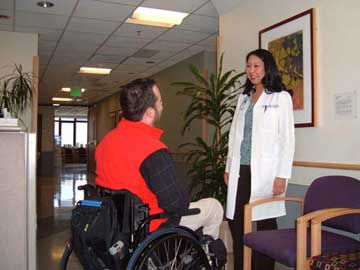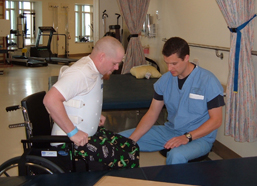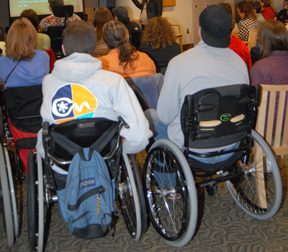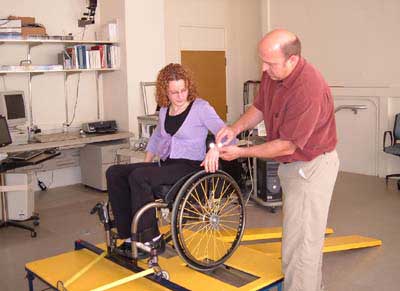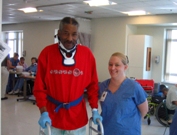Spinal Cord Injury Update
Summer 2010: Volume 19, Number 2
Depression after Spinal Cord Injury: Myths and Facts
Contents
- Myth 1: “Of course I am depressed! Wouldn’t you be?”
- Myth 2: Only psychological weaklings become depressed.
- Myth 3: Depression is a necessary part of adjusting to SCI and “If you aren’t depressed, you are in denial.”
- Myth 4: Depression will go away on its own and does not need to be treated.
- Myth 5: Antidepressants and counseling don’t work or can make things worse.
- What to do if you have symptoms of major depression now.
- Participate in Research:Two Studies of Depression and SCI
Depression is a loaded word and sometimes seems taboo or embarrassing to talk about. Maybe the stigma of depression has to do with myths and misconceptions we have about this condition. Perhaps if we dispel some of the myths and focus on facts we can do a better job of dealing with this condition in people with SCI.
Myth 1: “Of course I am depressed! Wouldn’t you be?”
A common belief is that after SCI everyone gets depressed. Some call this the hopelessness myth. The thinking goes something like this, “If I can’t walk I can never be happy again, therefore, I am depressed.” Part of this myth has to do with the definition of the word depression. We are not talking about the intense feelings of shock, loss and sadness that often come in waves during the first few days and weeks after SCI. Those feelings are common and normal. We are talking about persistent sad mood or loss of interest in life, as well as changes in sleep and appetite, poor energy, difficulty concentrating or making decisions, worthlessness or guilt, being restless or slowed down or having recurrent thoughts of death or suicide. When these symptoms last more than a couple of weeks we call this “major depression.”
Fact:
Only about 22% of people with SCI have major depression. One study found that during inpatient rehabilitation, 20% of people with SCI were persistently depressed, 18% were depressed for a week and then recovered and 62% were never depressed at all. While major depression is more common after SCI than in the general population (which has a 4-7% rate of depression), most people with SCI do not become depressed. But for those who do, it is a very real and serious problem.
Myth 2: Only psychological weaklings become depressed.
Fact:
Famous people that no one would describe as weak have been affected by major depression. These include football stars Terry Bradshaw and Ricky Williams, Mike Wallace of “60 Minutes” fame, musician John Lennon and actress Ashley Judd. We know that people who become depressed have different genetic backgrounds, brain chemicals, hormones and brain structure than people who do not. Whether someone becomes depressed is the result of the genes they are born with, life experiences they have and their activities, not weakness of character.
Myth 3: Depression is a necessary part of adjusting to SCI and “If you aren’t depressed, you are in denial.”
Some people think that adjusting to SCI is supposed to follow a certain pattern similar to Elizabeth Kubler-Ross’s stages of grief. In this way of thinking, depression follows denial and is a step toward healthy adjustment.
Fact:
This idea is particularly off-base when it comes to SCI. People with SCI do not typically go through these stages, or if they do, certainly not in a specific order. Becoming depressed is not a sign that someone is adjusting well; rather, it is a sign of problems that need to be addressed. People who are depressed stay in the hospital longer, make less progress toward independence, are less active and have more health problems. A big problem with thinking that depression is a normal part of grief is that this belief can keep people from getting the help they need.
Myth 4: Depression will go away on its own and does not need to be treated.
“I don’t want more meds.” “I’m not depressed.” “I am fighting it.” “I’ll be ok.” These are common responses when we talk to people with SCI who are depressed. Physicians are torn between providing necessary treatment for their patient and respecting the person’s right to refuse help.
Fact:
Leaving people alone and hoping depression will go away does not work very well. When someone is depressed for more than two weeks, they tend to remain depressed for months to years. One reason depression persists is that few people receive treatment. A recent study showed that less than one-third of people with SCI who become depressed receive antidepressant medications, and only about 10% receive any counseling. We don’t know how much of this under-treatment is because doctors don’t offer it versus people with SCI not wanting it.
Myth 5: Antidepressants and counseling don’t work or can make things worse.
Recent news stories have claimed that antidepressants are no better than a placebo (an inactive sugar pill) or even cause people to commit suicide. These concerns can prevent people from seeking treatment.
Fact:
Research shows that sometimes placebos can work as well as antidepressants when the depression is mild and short-lived. However, in people with moderate to severe depression, antidepressants work better than placebos. These studies have been done in the general population, however, not in the SCI population. We are currently doing the first-ever study to determine how effective antidepressants are in individuals with SCI (see Participate in Research, on right).
What about antidepressants and suicide?
First of all, depression is the main cause of suicide, and being treated for depression is the best way to reduce suicide risk. In rare cases, taking an antidepressant is associated with increased thoughts of suicide and suicide attempts. This occurs in people younger than 25 years old and tends to happen in the first 1-2 months after starting an antidepressant. Therefore, it is essential that people who begin antidepressants be monitored closely by their physician during the first 1-2 months.
Counseling is also an effective treatment for major depression—but not just any counseling. One of the most helpful counseling approaches is called cognitive-behavioral therapy (CBT). A few studies have shown that CBT can help improve depression in people with SCI, but more research is needed.
What to do if you have symptoms of major depression now.
Talk with your health care provider about effective treatment choices.
Antidepressants work by making your own brain chemistry more efficient. It can take a few weeks to feel a lot better. Side-effects tend to be mild and often subside over time. Your physician may need to increase the dose over time. If you have serious suicidal thoughts, contact your health care provider, your local crisis clinic or 911 right away. Some people need to be switched to a different antidepressant due to side effects or little benefit, so don’t be surprised by that. Most people need to stay on the antidepressant for 4-9 months to prevent relapse. Never stop taking an antidepressant abruptly. Work with your health care provider to taper off slowly.
Modern counseling is more like having a coach who can help you sharpen your coping skills and improve your strengths rather than the old stereotype of simply talking about the past. In CBT the counselor helps the person: build enjoyable and meaningful activities back into their life; notice the links between how we think and how we feel; and solve the daily problems that weigh the person down.
— Charles Bombardier, PhD
UW Rehabilitation Psychologist
Director, Northwest Regional Spinal Cord Injury System
Participate in Research:Two Studies of Depression and SCI
The Project to Improve Symptoms and Mood after Spinal Cord Injury (PRISMS) is the first federally funded clinical trial of an antidepressant for people with traumatic spinal cord injury (SCI) and depression. If you have an SCI, are 18-64 years old, feel down, depressed or hopeless, or have little interest or pleasure in doing things, are not taking venlafaxine XR and live within 100 miles of Seattle, WA, Birmingham, AL, Chicago, IL, Ann Arbor, MI or Dallas, TX you may qualify for this trial. Study participants will be paid up to $300 for taking part in this study.
The University of Washington and National Institute for Disability and Rehabilitation Research are conducting a study that looks at how community participation and community connectedness may affect one’s mood. To qualify you must have had a traumatic (motor vehicle accident, fall, etc.) spinal cord injury, be between 18-64 years old, and live within 100 miles of Seattle, WA. This phone survey will take between 15-25 minutes and you will be compensated $10 for your time.
For more information about either of these studies, please contact Christian Buhagiar at: Local: 206-897-4731; Toll Free: 866-577-8067.

